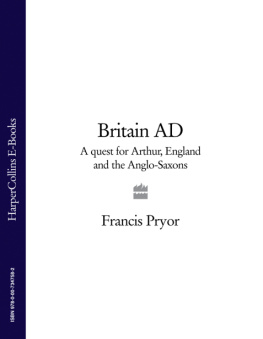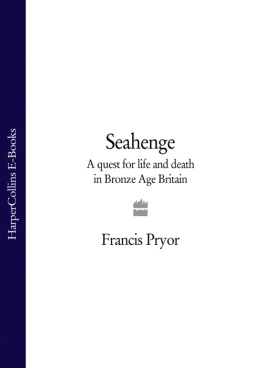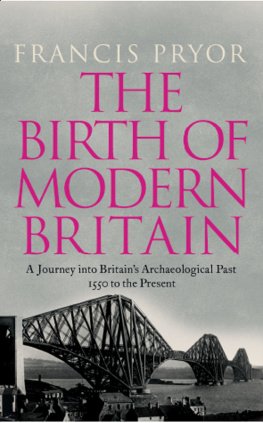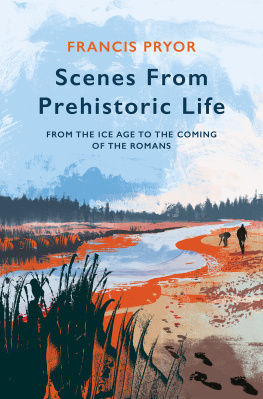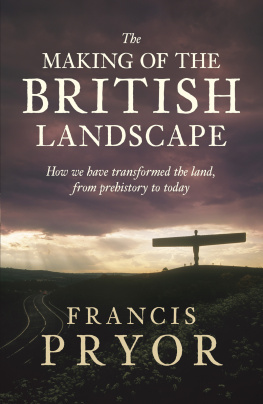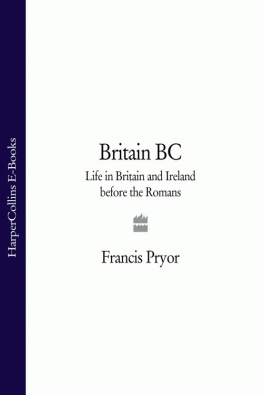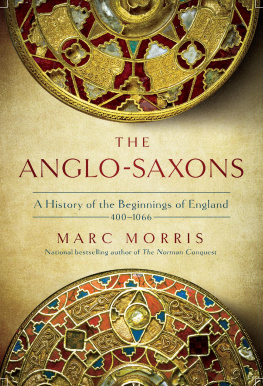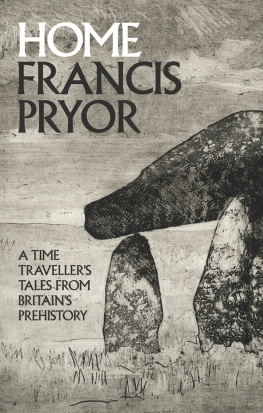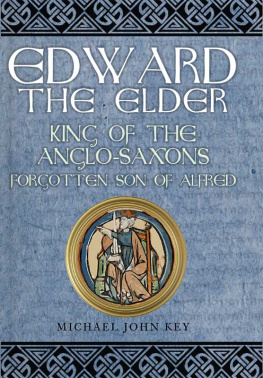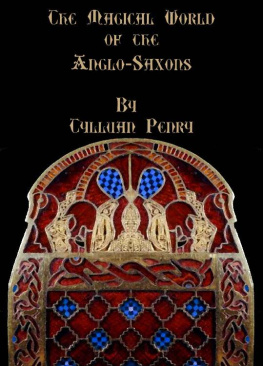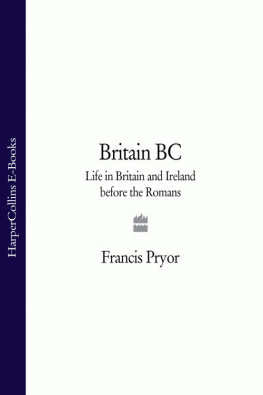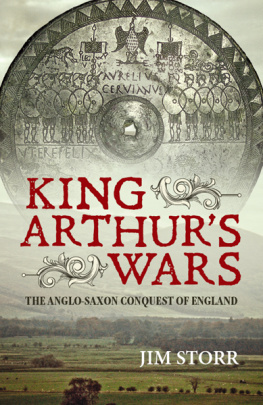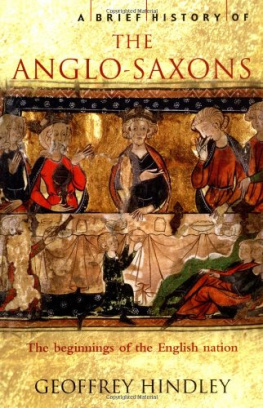Francis Pryor - Britain AD: A Quest for Arthur, England and the Anglo-Saxons
Here you can read online Francis Pryor - Britain AD: A Quest for Arthur, England and the Anglo-Saxons full text of the book (entire story) in english for free. Download pdf and epub, get meaning, cover and reviews about this ebook. year: 2009, publisher: HarperCollins, genre: Religion. Description of the work, (preface) as well as reviews are available. Best literature library LitArk.com created for fans of good reading and offers a wide selection of genres:
Romance novel
Science fiction
Adventure
Detective
Science
History
Home and family
Prose
Art
Politics
Computer
Non-fiction
Religion
Business
Children
Humor
Choose a favorite category and find really read worthwhile books. Enjoy immersion in the world of imagination, feel the emotions of the characters or learn something new for yourself, make an fascinating discovery.
- Book:Britain AD: A Quest for Arthur, England and the Anglo-Saxons
- Author:
- Publisher:HarperCollins
- Genre:
- Year:2009
- Rating:4 / 5
- Favourites:Add to favourites
- Your mark:
- 80
- 1
- 2
- 3
- 4
- 5
Britain AD: A Quest for Arthur, England and the Anglo-Saxons: summary, description and annotation
We offer to read an annotation, description, summary or preface (depends on what the author of the book "Britain AD: A Quest for Arthur, England and the Anglo-Saxons" wrote himself). If you haven't found the necessary information about the book — write in the comments, we will try to find it.
Britain AD: A Quest for Arthur, England and the Anglo-Saxons — read online for free the complete book (whole text) full work
Below is the text of the book, divided by pages. System saving the place of the last page read, allows you to conveniently read the book "Britain AD: A Quest for Arthur, England and the Anglo-Saxons" online for free, without having to search again every time where you left off. Put a bookmark, and you can go to the page where you finished reading at any time.
Font size:
Interval:
Bookmark:
For Maisie
From the reviews of Britain AD:
Controversial, deceptively clever and a damn good read
BBC History Magazine
Pryors opinionated (yet fairly argued) text rollicks along, informed by a great deal of recent research and new discoveriesEminently readable
British Archaeology
Francis Pryor has been an eloquent advocate for a new, fascinating vision of the prehistoric past. After Seahenge and Britain BC, this book completes an exhilarating trilogy in which the received ideas of far too long are swept away
Scotsman
Britain ad is in a sense the third volume of an informal trilogy on the archaeology and early history of Britain. It was not planned as a trilogy from the outset, because the idea only came to me gradually, as I was writing the first of the three books, Seahenge. I knew then that I had to write Britain bc, and in my heart of hearts I also wanted very much to tackle the challenge posed by the collapse of Roman rule and the onset of the so-called Dark Ages of the fifth to seventh centuries ad. But I felt more than a little daunted by the task. It was the writing of Britain bc that gave me the broader perspective and confidence to undertake the present work.
As I worked on Seahenge, I became aware that I was writing a book about what archaeologists refer to as process: the methods, approaches and techniques whereby archaeology is actually done. In that sense, Seahenge is a book less specifically about Britain than the other two; but if you read Seahenge first you will derive more from the Britain books, because you will better understand the thought processes behind the work of the various archaeologists and historians involved. Incidentally, I should add here that Mark Brennand and Maisie Taylor have written the full detailed, academic report on that most remarkable of sites. Their detailed analysis of the fifty-five timbersthe way they were worked and how they were positionedhasgiven us a unique insight into the way Early Bronze Age people viewed their world. I do not think it is an exaggeration to say that it has transformed our understanding of Early Bronze Age ritual and religion, and has confirmed many theories that had hitherto been based largely on speculation.
My approach is a personal one. I believe with some passion that archaeology is a personal discipline, and consider it misleading to suggest that there are such things as impersonal, dispassionate or objective archaeological books, just as there are no absolute facts in archaeology, other than the objects themselves. The objects are facts, but anything we attribute to them is interpretation. You may think that a term like cremation urn has to be factual; but that presupposes that we all agree on what constitutes a cremationand here, as elsewhere, there are many grounds for argument. If archaeologists and historians care about their subject, they will have axes to grind, and I prefer to sharpen mine in public.
In all my books I have tried to think and write in time-depth, because I am convinced that the fundamental attitudes underlying human society take a long time to change. Such a long-term view of British history and prehistory would have been impossible without the work of the Venerable Bede, who was one of the ablest minds of all time. It was Bede, in his great Historia Ecclesiastica Gentis Anglorum (Ecclesiastical History of the English People), which he completed in the year 731, who introduced the system of BC/AD to British history.
In Britain BC I used archaeology to give an impression of what it might have been like to have been alive in the supposedly anonymous and faceless world of prehistoric times. Prehistory, incidentally, is the name given to the study of human history before the advent of writing and written records, which arrived in Britain with the Roman Conquest of AD 43. Too often it is portrayed as a time when individuals, who of course could not be identified, did not matter. So they have tended to be forgotten, their humanity replaced by explanations that assume that prehistoric people somehow lacked free will. In the past prehistorians were too ready to attribute social and cultural innovation to external processes such as migration, economic collapse and environmental change. By approaching their subject in this cold-blooded way, they dehumanised it and made ancient people appear like machines that merely responded to various stimuli in a predictable fashion. This was far too mechanistic for my taste: I prefer my archaeology, like my friends, to be human, fallible and hard to explain. But for some reason nearly all archaeologists detest unsolved mysteries; they would prefer any explanation to no explanation.
Archaeologists dealing with the period covered by Britain ad have also fallen, too often, into a mechanistic explanation of change and the denial of free will to the so-called Anglo-Saxons. But there is an important difference between the so-called Dark Ages and prehistory, because now we are no longer wholly reliant on archaeology. In the present book I have tried to reconcile the contrasting views of ancient life provided by historians and archaeologists; and I conclude that in many significant respects the two are irreconcilable. I do not believe that this matters a great deal, because the authors of the only historical sources available were not writing history at all: they were writing polemic, with a well-defined audience and purpose. I shall have more to say on that in Chapters 1 and 2.
In this book I will suggest that in the fifth and sixth centuries AD there are, if anything, rather too many faces: unreliable ancient authors, semi-mythical leaders and one impossible hero called Arthur. These faces have been dominant for far too long, and the voices that have attended themsometimes their own, more often those of their modern academic supportershave tended to drown out the quieter, subtler, and to me far more persuasive, stirrings of archaeology. In this book I have made a conscious effort to redress this imbalance.
I have tried to write about more than just the lives of people in the past. I have attempted to make my work relevant to the world around us today. If archaeology is only about antiquity it will soon wither and die, as a pointless, self-serving pursuit. This trilogy addresses themes that matter in the twenty-first century: questions about ideology, the role of religion in daily life, problems of identity and sense of place. In the present book I have also grasped the nettle of what it means to be Britishbut I do not offer solutions, because there arent any. I also avoid the easy way out of saying that there is no such thing as Britishness. Popular definitions of Britishness certainly vary, but that does not invalidate them. Some of them may be jingoistic, or worse, but I believe that a sense of community, however one chooses to define that term, is something worth holding on to in a crowded world that is growing increasingly self-centred.
Finally, I write about something that is surely quintessentially British, namely the keeping up of appearances. Over the years I have become increasingly convinced that the British use their past as a surface coating, a facing, to prevent them from thinking about who they really are as individuals. You can see a rather extreme expression of this tendency if you visit Glastonbury. Anyone who stood outside the Abbey Gates with a loudhailer and proclaimed that Arthur never existed, and that Camelot and Avalon were not intended to be taken as literal truth, would be jeered to the echo, before the rocks began to fly.
Much of the Arthurian New Age philosophy is actually quite closely linked to early-twentieth-century views on racial purity, in which people like the Celts were seen to have an actual, ethnic identity. In todays New Age, the ancient Celt is seen to possess mystical virtues that your average Irish Dark Age warlord would have found less than attractive.Half-baked, wishy-washymysticism would not have appealed to him.
Font size:
Interval:
Bookmark:
Similar books «Britain AD: A Quest for Arthur, England and the Anglo-Saxons»
Look at similar books to Britain AD: A Quest for Arthur, England and the Anglo-Saxons. We have selected literature similar in name and meaning in the hope of providing readers with more options to find new, interesting, not yet read works.
Discussion, reviews of the book Britain AD: A Quest for Arthur, England and the Anglo-Saxons and just readers' own opinions. Leave your comments, write what you think about the work, its meaning or the main characters. Specify what exactly you liked and what you didn't like, and why you think so.

